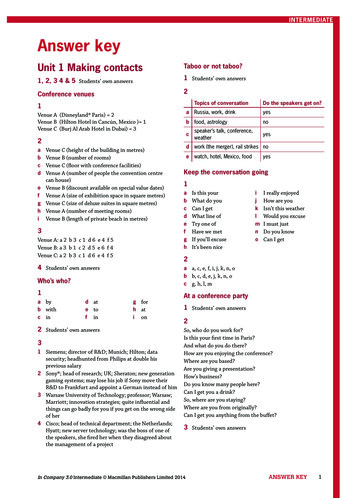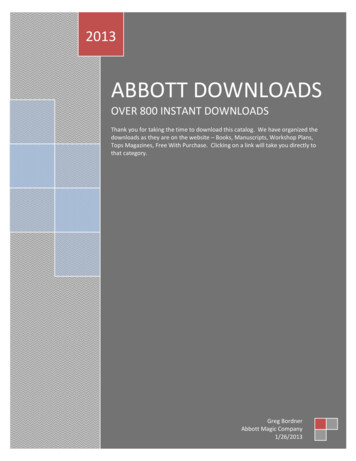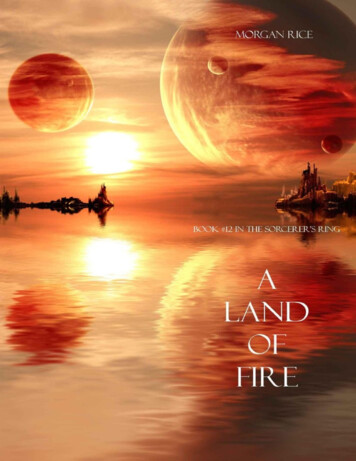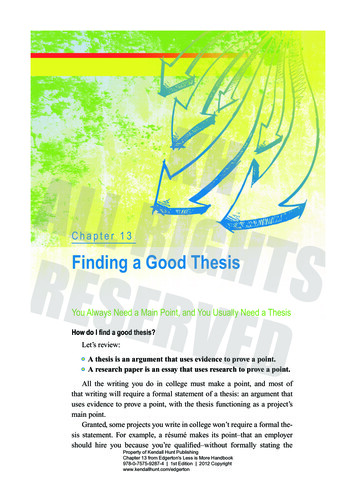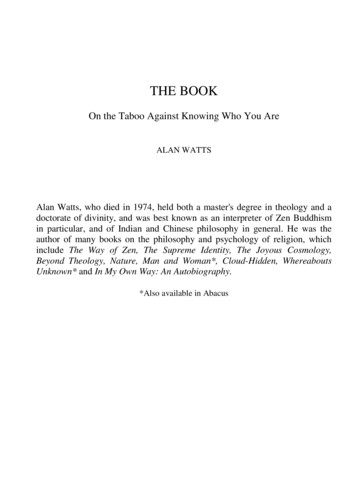
Transcription
THE BOOKOn the Taboo Against Knowing Who You AreALAN WATTSAlan Watts, who died in 1974, held both a master's degree in theology and adoctorate of divinity, and was best known as an interpreter of Zen Buddhismin particular, and of Indian and Chinese philosophy in general. He was theauthor of many books on the philosophy and psychology of religion, whichinclude The Way of Zen, The Supreme Identity, The Joyous Cosmology,Beyond Theology, Nature, Man and Woman*, Cloud-Hidden, WhereaboutsUnknown* and In My Own Way: An Autobiography.*Also available in Abacus
Also by Alan Watts in AbacusNATURE, MAN AND WOMANCLOUD-HIDDEN, WHEREABOUTS UNKNOWN
Alan WattsTHE BOOKOn the Taboo Against KnowingWho You Are
ABACUS edition published in 1973by Sphere Books Ltd30/32 Gray's Inn Road, London, WC1X 8JLReprinted 1976, 1977First published in Great Britainby Jonathan Cape Ltd 1969Copyright 1966 by Alan WattsThis book is sold subject to the condition that it shall not, by wayof trade or otherwise, be lent, re-sold, hired out, or otherwisecirculated without the publisher's prior consent in any form ofbinding or cover other than that in which it is published andwithout a similar condition including this condition beingimposed on the subsequent purchaser.Set in Monotype Times RomanPrinted in Great Britain by Hazell Watson & Viney LtdAylesbury, Bucks
To my Children and RichardLilaDianeAnn*MyraMichael
ACKNOWLEDGMENTSThe author is grateful to the following for permission to quote: CambridgeUniversity Press for The Nature of the Physical World by Sir ArthurEddington and My View of the World by Erwin Schrödinger; Prentice-Hall Inc.for Quantum Theory by David Bohm; William Collins & Sons Ltd for TheGospel According to Thomas, translated by A. Guillaumont and others; J. M.Dent & Sons Ltd for Collected Poems of Dylan Thomas; and Methuen & Co.Ltd for The Collected Poems of G. K. Chesterton.
CONTENTSPREFACE91Inside Information112The Game of Black-and-White293How To Be a Genuine Fake534The World Is Your Body825So What?1006IT125THE BOOKS143
PREFACETHIS BOOK explores an unrecognized but mighty taboo—our tacitconspiracy to ignore who, or what, we really are. Briefly, the thesis isthat the prevalent sensation of oneself as a separate ego enclosed in abag of skin is a hallucination which accords neither with Westernscience nor with the experimental philosophy-religions of the East—inparticular the central and germinal Vedanta philosophy of Hinduism.This hallucination underlies the misuse of technology for the violentsubjugation of man's natural environment and, consequently, itseventual destruction.We are therefore in urgent need of a sense of our own existencewhich is in accord with the physical facts and which overcomes ourfeeling of alienation from the universe. For this purpose I have drawnon the insights of Vedanta, stating them, however, in a completelymodern and Western style—so that this volume makes no attempt to bea textbook on or introduction to Vedanta in the ordinary sense. It israther a cross-fertilization of Western science with an Eastern intuition.Particular thanks are due to my wife, Mary Jane, for her carefuleditorial work and her comments on the manuscript. Gratitude is alsodue to the Bollingen Foundation for its support of a project whichincluded the writing of this book.Sausalito, CaliforniaJanuary, 1966ALAN WATTS
CHAPTER ONEINSIDE INFORMATIONJUST WHAT should a young man or woman know in order to be "inthe know"? Is there, in other words, some inside information, somespecial taboo, some real lowdown on life and existence that mostparents and teachers either don't know or won't tell?In Japan it was once customary to give young people about to bemarried a "pillow book." This was a small volume of wood-block prints,often colored, showing all the details of sexual intercourse. It wasn't justthat, as the Chinese say, "one picture is worth ten thousand words." Itwas also that it spared parents the embarrassment of explaining theseintimate matters face-to-face. But today in the West you can get suchinformation at any newsstand. Sex is no longer a serious taboo.Teenagers sometimes know more about it than adults.But if sex is no longer the big taboo, what is? For there is alwayssomething taboo, something repressed, unadmitted, or just glimpsedquickly out of the corner of one's eye because a direct look is toounsettling. Taboos lie within taboos, like the skins of an onion. What,then, would be The Book which fathers might slip to their sons andmothers to their daughters, without ever admitting it openly?In some circles there is a strong taboo on religion, even in circleswhere people go to church or read the Bible. Here, religion is one's ownprivate business. It is bad form or uncool to talk or argue about it, andvery bad indeed to make a big show of piety. Yet when you get in onthe inside of almost any standard-brand religion, you wonder what onearth the hush was about. Surely The Book I have in mind wouldn't bethe Bible, "the Good Book"—that fascinating anthology of ancientwisdom, history, and fable which has for so long been treated as aSacred Cow that it might well be locked up for a century or two so thatmen could hear it again with clean ears. There are indeed secrets in theBible, and some very subversive ones, but they are all so muffled up incomplications, in archaic symbols and ways of thinking, that
Christianity has become incredibly difficult to explain to a modernperson. That is, unless you are content to water it down to being goodand trying to imitate Jesus, but no one ever explains just how to do that.To do it you must have a particular power from God known as "grace,"but all that we really know about grace is that some get it, and somedon't.The standard-brand religions, whether Jewish, Christian,Mohammedan, Hindu, or Buddhist, are—as now practiced—likeexhausted mines: very hard to dig. With some exceptions not too easilyfound, their ideas about man and the world, their imagery, their rites,and their notions of the good life don't seem to fit in with the universe aswe now know it, or with a human world that is changing so rapidly thatmuch of what one learns in school is already obsolete on graduationday.The Book I am thinking about would not be religious in the usualsense, but it would have to discuss many things with which religionshave been concerned—the universe and man's place in it, the mysteriouscenter of experience which we call "I myself," the problems of life andlove, pain and death, and the whole question of whether existence hasmeaning in any sense of the word. For there is a growing apprehensionthat existence is a rat-race in a trap: living organisms, including people,are merely tubes which put things in at one end and let them out at theother, which both keeps them doing it and in the long run wears themout. So to keep the farce going, the tubes find ways of making newtubes, which also put things in at one end and let them out at the other.At the input end they even develop ganglia of nerves called brains, witheyes and ears, so that they can more easily scrounge around for things toswallow. As and when they get enough to eat, they use up their surplusenergy by wiggling in complicated patterns, making all sorts of noisesby blowing air in and out of the input hole, and gathering together ingroups to fight with other groups. In time, the tubes grow such anabundance of attached appliances that they are hardly recognizable asmere tubes, and they manage to do this in a staggering variety of forms.There is a vague rule not to eat tubes of your own form, but in generalthere is serious competition as to who is going to be the top type of tube.All this seems marvelously futile, and yet, when you begin to think
about it, it begins to be more marvelous than futile. Indeed, it seemsextremely odd.It is a special kind of enlightenment to have this feeling that theusual, the way things normally are, is odd—uncanny and highlyimprobable. G. K. Chesterton once said that it is one thing to be amazedat a gorgon or a griffin, creatures which do not exist; but it is quiteanother and much higher thing to be amazed at a rhinoceros or a giraffe,creatures which do exist and look as if they don't. This feeling ofuniversal oddity includes a basic and intense wondering about the senseof things. Why, of all possible worlds, this colossal and apparentlyunnecessary multitude of galaxies in a mysteriously curved space-timecontinuum, these myriads of differing tube-species playing franticgames of one-upmanship, these numberless ways of "doing it" from theelegant architecture of the snow crystal or the diatom to the startlingmagnificence of the lyrebird or the peacock?Ludwig Wittgenstein and other modern "logical" philosophers havetried to suppress this question by saying that it has no meaning andought not to be asked. Most philosophical problems are to be solved bygetting rid of them, by coming to the point where you see that suchquestions as "Why this universe?" are a kind of intellectual neurosis, amisuse of words in that the question sounds sensible but is actually asmeaningless as asking "Where is this universe?" when the only thingsthat are anywhere must be somewhere inside the universe. The task ofphilosophy is to cure people of such nonsense. Wittgenstein, as we shallsee, had a point there. Nevertheless, wonder is not a disease. Wonder,and its expression in poetry and the arts, are among the most importantthings which seem to distinguish men from other animals, andintelligent and sensitive people from morons.Is there, then, some kind of a lowdown on this astounding scheme ofthings, something that never really gets out through the usual channelsfor the Answer—the historic religions and philosophies? There is. It hasbeen said again and again, but in such a fashion that we, today, in thisparticular civilization do not hear it. We do not realize that it is utterlysubversive, not so much in the political and moral sense, as in that itturns our ordinary view of things, our common sense, inside out andupside down. It may of course have political and moral consequences,
but as yet we have no clear idea of what they may be. Hitherto this innerrevolution of the mind has been confined to rather isolated individuals;it has never, to my knowledge, been widely characteristic ofcommunities or societies. It has often been thought too dangerous forthat. Hence the taboo.But the world is in an extremely dangerous situation, and seriousdiseases often require the risk of a dangerous cure—like the Pasteurserum for rabies. It is not that we may simply blow up the planet withnuclear bombs, strangle ourselves with overpopulation, destroy ournatural resources through poor conservation, or ruin the soil and itsproducts with improperly understood chemicals and pesticides. Beyondall these is the possibility that civilization may be a huge technologicalsuccess, but through methods that most people will find baffling,frightening, and disorienting—because, for one reason alone, themethods will keep changing. It may be like playing a game in which therules are constantly changed without ever being made clear—a gamefrom which one cannot withdraw without suicide, and in which one cannever return to an older form of the game.But the problem of man and technics is almost always stated in thewrong way. It is said that humanity has evolved one-sidedly, growing intechnical power without any comparable growth in moral integrity, or,as some would prefer to say, without comparable progress in educationand rational thinking. Yet the problem is more basic. The root of thematter is the way in which we feel and conceive ourselves as humanbeings, our sensation of being alive, of individual existence and identity.We suffer from a hallucination, from a false and distorted sensation ofour own existence as living organisms. Most of us have the sensationthat "I myself" is a separate center of feeling and action, living insideand bounded by the physical body—a center which "confronts" an"external" world of people and things, making contact through thesenses with a universe both alien and strange. Everyday figures ofspeech reflect this illusion. "I came into this world." "You must facereality." "The conquest of nature."This feeling of being lonely and very temporary visitors in theuniverse is in flat contradiction to everything known about man (and allother living organisms) in the sciences. We do not "come into" this
world; we come out of it, as leaves from a tree. As the ocean "waves,"the universe "peoples." Every individual is an expression of the wholerealm of nature, a unique action of the total universe. This fact is rarely,if ever, experienced by most individuals. Even those who know it to betrue in theory do not sense or feel it, but continue to be aware ofthemselves as isolated "egos" inside bags of skin.The first result of this illusion is that our attitude to the world"outside" us is largely hostile. We are forever "conquering" nature,space, mountains, deserts, bacteria, and insects instead of learning tocooperate with them in a harmonious order. In America the greatsymbols of this conquest are the bulldozer and the rocket—theinstrument that batters the hills into flat tracts for little boxes made ofticky-tacky and the great phallic projectile that blasts the sky.(Nonetheless, we have fine architects who know how to fit houses intohills without ruining the landscape, and astronomers who know that theearth is already way out in space, and that our first need for exploringother worlds is sensitive electronic instruments which, like our eyes,will bring the most distant objects into our own brains.)(1) The hostileattitude of conquering nature ignores the basic interdependence of allthings and events—that the world beyond the skin is actually anextension of our own bodies—and will end in destroying the veryenvironment from which we emerge and upon which our whole lifedepends.The second result of feeling that we are separate minds in an alien,and mostly stupid, universe is that we have no common sense, no way ofmaking sense of the world upon which we are agreed in common. It'sjust my opinion against yours, and therefore the most aggressive andviolent (and thus insensitive) propagandist makes the decisions. Amuddle of conflicting opinions united by force of propaganda is theworst possible source of control for a powerful technology.It might seem, then, that our need is for some genius to invent a newreligion, a philosophy of life and a view of the world, that is plausibleand generally acceptable for the late twentieth century, and throughwhich every individual can feel that the world as a whole and his ownlife in particular have meaning. This, as history has shown repeatedly, isnot enough. Religions are divisive and quarrelsome. They are a form of
one-upmanship because they depend upon separating the "saved" fromthe "damned," the true believers from the heretics, the in-group from theout-group. Even religious liberals play the game of "we're-moretolerant-than-you." Furthermore, as systems of doctrine, symbolism, andbehavior, religions harden into institutions that must command loyalty,be defended and kept "pure," and—because all belief is fervent hope,and thus a cover-up for doubt and uncertainty—religions must makeconverts. The more people who agree with us, the less nagginginsecurity about our position. In the end one is committed to being aChristian or a Buddhist come what may in the form of new knowledge.New and indigestible ideas have to be wangled into the religioustradition, however inconsistent with its original doctrines, so that thebeliever can still take his stand and assert, "I am first and foremost afollower of Christ/Mohammed/Buddha, or whomever." Irrevocablecommitment to any religion is not only intellectual suicide; it is positiveunfaith because it closes the mind to any new vision of the world. Faithis, above all, open-ness—an act of trust in the unknown.An ardent Jehovah's Witness once tried to convince me that if therewere a God of love, he would certainly provide mankind with a reliableand infallible textbook for the guidance of conduct. I replied that noconsiderate God would destroy the human mind by making it so rigidand unadaptable as to depend upon one book, the Bible, for all theanswers. For the use of words, and thus of a book, is to point beyondthemselves to a world of life and experience that is not mere words oreven ideas. Just as money is not real, consumable wealth, books are notlife. To idolize scriptures is like eating paper currency.Therefore The Book that I would like to slip to my children woulditself be slippery. It would slip them into a new domain, not of ideasalone, but of experience and feeling. It would be a temporary medicine,not a diet; a point of departure, not a perpetual point of reference. Theywould read it and be done with it, for if it were well and clearly writtenthey would not have to go back to it again and again for hiddenmeanings or for clarification of obscure doctrines.We do not need a new religion or a new bible. We need a newexperience—a new feeling of what it is to be "I." The lowdown (whichis, of course, the secret and profound view) on life is that our normal
sensation of self is a hoax or, at best, a temporary role that we areplaying, or have been conned into playing—with our own tacit consent,just as every hypnotized person is basically willing to be hypnotized.The most strongly enforced of all known taboos is the taboo againstknowing who or what you really are behind the mask of your apparentlyseparate, independent, and isolated ego. I am not thinking of Freud'sbarbarous Id or Unconscious as the actual reality behind the façade ofpersonality. Freud, as we shall see, was under the influence of anineteenth-century fashion called "reductionism," a curious need to putdown human culture and intelligence by calling it a fluky by-product ofblind and irrational forces. They worked very hard, then, to prove thatgrapes can grow on thornbushes.As is so often the way, what we have suppressed and overlooked issomething startlingly obvious. The difficulty is that it is so obvious andbasic that one can hardly find the words for it. The Germans call it aHintergedanke, an apprehension lying tacitly in the back of our mindswhich we cannot easily admit, even to ourselves. The sensation of "I" asa lonely and isolated center of being is so powerful andcommonsensical, and so fundamental to our modes of speech andthought, to our laws and social institutions, that we cannot experienceselfhood except as something superficial in the scheme of the universe. Iseem to be a brief light that flashes but once in all the aeons of time—arare, complicated, and all-too-delicate organism on the fringe ofbiological evolution, where the wave of life bursts into individual,sparkling, and multicolored drops that gleam for a moment only tovanish forever. Under such conditioning it seems impossible and evenabsurd to realize that myself does not reside in the drop alone, but in thewhole surge of energy which ranges from the galaxies to the nuclearfields in my body. At this level of existence "I" am immeasurably old;my forms are infinite and their comings and goings are simply thepulses or vibrations of a single and eternal flow of energy.The difficulty in realizing this to be so is that conceptual thinkingcannot grasp it. It is as if the eyes were trying to look at themselvesdirectly, or as if one were trying to describe the color of a mirror interms of colors reflected in the mirror. Just as sight is something morethan all things seen, the foundation or "ground" of our existence and our
awareness cannot be understood in terms of things that are known. Weare forced, therefore, to speak of it through myth—that is, throughspecial metaphors, analogies, and images which say what it is like asdistinct from what it is. At one extreme of its meaning, "myth" is fable,falsehood, or superstition. But at another, "myth" is a useful and fruitfulimage by which we make sense of life in somewhat the same way thatwe can explain electrical forces by comparing them with the behavior ofwater or air. Yet "myth," in this second sense, is not to be taken literally,just as electricity is not to be confused with air or water. Thus in usingmyth one must take care not to confuse image with fact, which would belike climbing up the signpost instead of following the road.Myth, then, is the form in which I try to answer when children askme those fundamental metaphysical questions which come so readily totheir minds: "Where did the world come from?" "Why did God makethe world?" "Where was I before I was born?" "Where do people gowhen they die?" Again and again I have found that they seem to besatisfied with a simple and very ancient story, which goes somethinglike this:"There was never a time when the world began, because it goesround and round like a circle, and there is no place on a circle where itbegins. Look at my watch, which tells the time; it goes round, and so theworld repeats itself again and again. But just as the hour-hand of thewatch goes up to twelve and down to six, so, too, there is day and night,waking and sleeping, living and dying, summer and winter. You can'thave any one of these without the other, because you wouldn't be able toknow what black is unless you had seen it side-by-side with white, orwhite unless side-by-side with black."In the same way, there are times when the world is, and times whenit isn't, for if the world went on and on without rest for ever and ever, itwould get horribly tired of itself. It comes and it goes. Now you see it;now you don't. So because it doesn't get tired of itself, it always comesback again after it disappears. It's like your breath: it goes in and out, inand out, and if you try to hold it in all the time you feel terrible. It's alsolike the game of hide-and-seek, because it's always fun to find newways of hiding, and to seek for someone who doesn't always hide in thesame place.
"God also likes to play hide-and-seek, but because there is nothingoutside God, he has no one but himself to play with. But he gets overthis difficulty by pretending that he is not himself. This is his way ofhiding from himself. He pretends that he is you and I and all the peoplein the world, all the animals, all the plants, all the rocks, and all thestars. In this way he has strange and wonderful adventures, some ofwhich are terrible and frightening. But these are just like bad dreams,for when he wakes up they will disappear."Now when God plays hide and pretends that he is you and I, he doesit so well that it takes him a long time to remember where and how hehid himself. But that's the whole fun of it—just what he wanted to do.He doesn't want to find himself too quickly, for that would spoil thegame. That is why it is so difficult for you and me to find out that weare God in disguise, pretending not to be himself. But when the gamehas gone on long enough, all of us will wake up, stop pretending, andremember that we are all one single Self—the God who is all that thereis and who lives for ever and ever."Of course, you must remember that God isn't shaped like a person.People have skins and there is always something outside our skins. Ifthere weren't, we wouldn't know the difference between what is insideand outside our bodies. But God has no skin and no shape because thereisn't any outside to him. [With a sufficiently intelligent child, I illustratethis with a Möbius strip—a ring of paper tape twisted once in such away that it has only one side and one edge.] The inside and the outsideof God are the same. And though I have been talking about God as 'he'and not 'she,' God isn't a man or a woman. I didn't say 'it' because weusually say 'it' for things that aren't alive."God is the Self of the world, but you can't see God for the samereason that, without a mirror, you can't see your own eyes, and youcertainly can't bite your own teeth or look inside your head. Your self isthat cleverly hidden because it is God hiding."You may ask why God sometimes hides in the form of horriblepeople, or pretends to be people who suffer great disease and pain.Remember, first, that he isn't really doing this to anyone but himself.Remember, too, that in almost all the stories you enjoy there have to bebad people as well as good people, for the thrill of the tale is to find out
how the good people will get the better of the bad. It's the same as whenwe play cards. At the beginning of the game we shuffle them all into amess, which is like the bad things in the world, but the point of thegame is to put the mess into good order, and the one who does it best isthe winner. Then we shuffle the cards once more and play again, and soit goes with the world."This story, obviously mythical in form, is not given as a scientificdescription of the way things are. Based on the analogies of games andthe drama, and using that much worn-out word "God" for the Player, thestory claims only to be like the way things are. I use it just asastronomers use the image of inflating a black balloon with white spotson it for the galaxies, to explain the expanding universe. But to mostchildren, and many adults, the myth is at once intelligible, simple, andfascinating. By contrast, so many other mythical explanations of theworld are crude, tortuous, and unintelligible. But many people think thatbelieving in the unintelligible propositions and symbols of theirreligions is the test of true faith. "I believe," said Tertullian ofChristianity, "because it is absurd."People who think for themselves do not accept ideas on this kind ofauthority. They don't feel commanded to believe in miracles or strangedoctrines as Abraham felt commanded by God to sacrifice his son Isaac.As T. George Harris put it:The social hierarchies of the past, where some boss above youalways punished any error, conditioned men to feel a chain ofharsh authority reaching all the way "up there." We don't feel thisbond in today's egalitarian freedom. We don't even have, since Dr.Spock, many Jehovah-like fathers in the human family. So theaverage unconscious no longer learns to seek forgiveness from awrathful God above.But, he continues—Our generation knows a cold hell, solitary confinement in thislife, without a God to damn or save it. Until man figures out thetrap and hunts. "the Ultimate Ground of Being," he has no reason
at all for his existence. Empty, finite, he knows only that he willsoon die. Since this life has no meaning, and he sees no future life,he is not really a person but a victim of self-extinction.(2)"The Ultimate Ground of Being" is Paul Tillich's decontaminatedterm for "God" and would also do for "the Self of the world" as I put itin my story for children. But the secret which my story slips over to thechild is that the Ultimate Ground of Being is you. Not, of course, theeveryday you which the Ground is assuming, or "pretending" to be, butthat inmost Self which escapes inspection because it's always theinspector. This, then, is the taboo of taboos: you're IT!Yet in our culture this is the touchstone of insanity, the blackest ofblasphemies, and the wildest of delusions. This, we believe, is theultimate in megalomania—an inflation of the ego to complete absurdity.For though we cultivate the ego with one hand, we knock it down withthe other. From generation to generation we kick the stuffing out of ourchildren to teach them to "know their place" and to behave, think, andfeel with proper modesty as befits one little ego among many. As mymother used to say, "You're not the only pebble on the beach!"Anyone in his right mind who believes that he is God should becrucified or burned at the stake, though now we take the more charitableview that no one in his right mind could believe such nonsense. Only apoor idiot could conceive himself as the omnipotent ruler of the world,and expect everyone else to fall down and worship.But this is because we think of God as the King of the Universe, theAbsolute Technocrat who personally and consciously controls everydetails of his cosmos—and that is not the kind of God in my story. Infact, it isn't my story at all, for any student of the history of religions willknow that it comes from ancient India, and is the mythical way ofexplaining the Vedanta philosophy. Vedanta is the teaching of theUpanishads, a collection of dialogues, stories, and poems, some ofwhich go back to at least 800 B.C. Sophisticated Hindus do not think ofGod as a special and separate superperson who rules the world fromabove, like a monarch. Their God is "underneath" rather than "above"everything, and he (or it) plays the world from inside. One might saythat if religion is the opium of the people, the Hindus have the inside
dope. What is more, no Hindu can realize that he is God in disguisewithout seeing at the same time that this is true of everyone andeverything else. In the Vedanta philosophy, nothing exists except God.There seem to be other things than God, but only because he isdreaming them up and making them his disguises to play hide-and-seekwith himself. The universe of seemingly separate things is therefore realonly for a while, not eternally real, for it comes and goes as the Selfhides and seeks itself.But Vedanta is much more than the idea or the belief that this is so. Itis centrally and above all the experience, the immediate knowledge ofits being so, and for this reason such a complete subversion of ourordinary way of seeing things. It turns the world inside out and outsidein. Likewise, a saying attributed to Jesus runs:When you make the two one, andwhen you make the inner as the outerand the outer as the inner and the above as the below .then shall you enter [the Kingdom].I am the Light that i
ALAN WATTS Alan Watts, who died in 1974, held both a master's degree in theology and a doctorate of divinity, and was best known as an interpreter of Zen Buddhism in particular, and of Indian and Chinese philosophy in general. He was the author of many books on the philosophy and psychology of religion, which include The Way of Zen, The Supreme Identity, The Joyous Cosmology, Beyond Theology .



